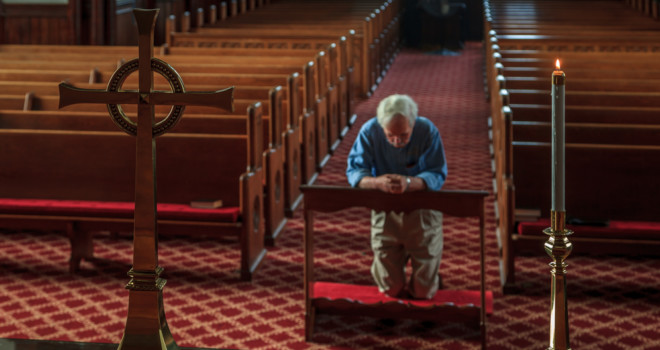The county that I live in recently declared new “safer at home” orders, and my heart just sank when I heard the news. Thankfully, the new orders are not as restrictive as the ones in the spring, but still…it is so disheartening to find ourselves in this place again. We live far from family, and our pandemic bubble has remained incredibly small. Recently, it seemed like we were just getting a sense of normalcy, and then our local hospitals began filling up too quickly. What we hoped might be a holiday season spent with loved ones may end up being spent with only the members of our little family.
Different parts of the country are experiencing different restrictions, but all of us have been affected by the pandemic. And now, at least for those of us living in areas that are experiencing a rise in cases, we may find ourselves faced with even more restrictions. It does not feel like there is much to be thankful for.
The Meaning of Eucharist
I am truly grateful that I live in a diocese where churches have remained open throughout the course of the pandemic (although there was a brief cessation of public Masses, Confession and adoration was still available). I am aware, though, that many in the United States and around the world have lost or are again losing access to Mass and the Sacraments. In a time when we need Christ the most, many of us have found ourselves without him, or with less access to him than usual, or with access to him behind a mask and socially distanced from our fellow congregants.
What, then, can we do? How can we possibly be grateful during this?
I am reminded of the meaning of the word “Eucharist.” Eucharist means thanksgiving.
When I think of the word thanksgiving, I imagine a large family dinner, good food, etc. Thanksgiving this year will not look like that. But even if the material trappings are removed, the Eucharist is still present, here in my neighborhood. We live in a small suburb, and our parish church is a couple of blocks away. When the leaves have fallen from the trees, we can make out the outline of the church, lit against the night sky. Even when we cannot be with him, he is always right there, waiting for us.
The Gift of Suffering
Several years ago, I was pregnant with my fourth child and suffering from moderate hyperemesis gravidarum (a severe form of morning sickness). The holidays that year were anything but enjoyable for me. I could barely eat, I couldn’t leave bed without losing the small amount of food that I could get down, and I had recently been giving a Zofran pump, so that I could have medicine pumping into me 24/7.
Yet, it was one of the best Christmases of my life.
That year, I had nothing to look forward to. I was too sick to leave bed and open presents, too sick to eat any holiday food, too sick to sit up, too sick to listen to Christmas music, too sick to watch Christmas movies. Even the sensation of socks on my feet or human touch made me begin to dry heave.
All that remained for me that year was the Eucharist. The only thing that I could do was attend Midnight Mass (ironically, the middle of the night was the least nauseous time of day for me). And after an hour of sitting very still in the pew and praying not to be sick… I received the Eucharist. That year, all I had was Christ, in the Eucharist, and it was truly the richest Christmas that I had ever experienced. Everything that I normally tried to cling to for happiness was stripped away. All that remained was Christ. Without that suffering, I would not have been able to experience how much I needed him.
An Invitation to True Thanksgiving
During this past spring, I was re-reading a passage from Song of Songs, and was struck by the words, “Here he stands behind our wall, gazing through the windows, peering through the lattices.” At that time, deprived of the regular access to the Eucharist that I was used to, I felt so alone. In encountering that verse, I realized—more than I was longing for him, he was longing for me. And the brick wall of the church that stood between us could not prevent him from reaching me. In fact, in that beautiful book of the Bible, the wall serves as a place of trust between the Lover and the Beloved. What would appear to be a barrier is in fact a means of increased longing.
The wall of suffering that we are all experiencing this Thanksgiving/Advent/Christmas—to the world, it may seem a stumbling block. But to those of us who are called to deeper union with Christ, thanks to our baptism? That wall of suffering is nothing more than the cross. And the cross is always an invitation to a deeper union with Christ.
And so, as we face unexpected inconveniences, sufferings, times of loneliness, and unpleasant restrictions, we can find hope in the knowledge that Christ stands behind that wall of suffering. Rather than run from it, we are being invited to embrace the cross, and to unite our own sufferings to his.
Because union with him, present and loving us in our suffering, is something to be truly thankful for.
✠












